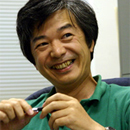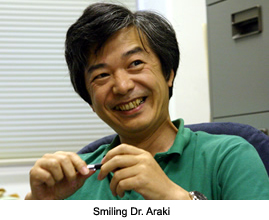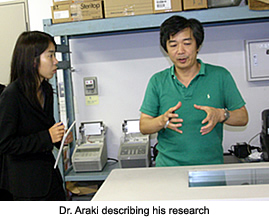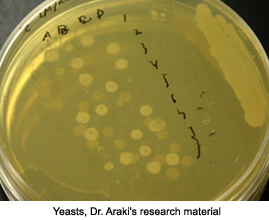ARAKI, Hiroyuki D. Sc., Professor

- Division of Microbial Genetics, Araki Group
Research: researcher’s passion and commitment
Prof. Hiroyuki ARAKI has an impressive look of a calm observer. In front of him, you have to be your authentic self, for he can never be deceived.
- Strength of being able to admit one’s weakness
 I might sound severe,” started Dr. Araki, “but it’s whether you totally commit yourself to your research or do nothing. I want all researchers to be passionate and totally committed. “His words for future researchers are plain and straightforward. How many scientists would speak so plainly to students of the importance of total commitment? He does that as someone who has been contemplating about commitment since the time he entered university.
I might sound severe,” started Dr. Araki, “but it’s whether you totally commit yourself to your research or do nothing. I want all researchers to be passionate and totally committed. “His words for future researchers are plain and straightforward. How many scientists would speak so plainly to students of the importance of total commitment? He does that as someone who has been contemplating about commitment since the time he entered university.- In the 1970s, when Dr. Araki was an undergraduate, most parents would be opposed if their children chose to major in science in college because this choice did not guarantee employment or income upon graduation. “In those days, we were already very determined, having made such a choice,” says Dr. Araki plainly, and he was far more determined than his classmates. Proof: he worked so hard as a student that he regrets it a little today. “Looking back, I think I should have had some fun back then.” As early as in his first year, he plunged into the specialized books recommended by his professors, accumulating basic knowledge. He spent hours on end in laboratories in the fourth year. He never went home before two a.m.
- “Nobody’s perfect, but once you know what’s lacking in you and in what areas you should make extra effort, you only need to work harder in these areas.” And work hard he did to survive in the world of researchers where results count before anything. He has been able to do this probably because he knew his weaknesses far better than anyone else.
- Making a career out of something you love
 Dr. Araki has arrived at his research subjected, genetics at the source of life, after having deeply contemplated what he wanted to do or could do. He has since consistently been involved in research into DNA metabolism. At present, he is actively working to elucidate the mechanism of DNA replication using yeasts. When he becomes preoccupied with his research, he sleeps less. Once he rushed to another laboratory several hundred kilometers away from his own just to obtain one piece of information. He remains concentrated as far as his physical strength allows.
Dr. Araki has arrived at his research subjected, genetics at the source of life, after having deeply contemplated what he wanted to do or could do. He has since consistently been involved in research into DNA metabolism. At present, he is actively working to elucidate the mechanism of DNA replication using yeasts. When he becomes preoccupied with his research, he sleeps less. Once he rushed to another laboratory several hundred kilometers away from his own just to obtain one piece of information. He remains concentrated as far as his physical strength allows.- Meanwhile, he says he now understands what he did not understand as a high school student: “it’s tough to make a career out of something you love.” When research does not go well, he has nothing else that absorbs him sufficiently to dissipate his worries. The happiness of having a full-time occupation of what you love always comes in pair with the difficulty of having no escape. Nevertheless, Dr. Araki has never wished to abandon research. He is simply too curious about life and has too many “why’s.” He is not sure if he is suited for research or if he has trodden the right path. Still he keeps at it, with all these unanswered questions.
- Nuturing future independent-minded researchers
- Dr. Araki, who has undergone trial and error as a researcher, believed that the ability to discuss with others is essential to become a full-fledged researcher. By discussing with others, you can test your reasoning and clarify what modifications are necessary. So he often takes the initiative in starting discussions with students and researchers in his laboratory.
 “Young people are not sure if they’ll continue the same research they’re doing now. But their present research activities help them acquire logical thinking process, with which they’ll be able to design and carry out their experiments anywhere. “Knowing firsthand the severity of the world research, he wishes to nurture solid abilities in young researchers.” I don’t mind them talking back to me. I don’t want young scientists to hesitate to disagree with their elders if their views are well founded.”
“Young people are not sure if they’ll continue the same research they’re doing now. But their present research activities help them acquire logical thinking process, with which they’ll be able to design and carry out their experiments anywhere. “Knowing firsthand the severity of the world research, he wishes to nurture solid abilities in young researchers.” I don’t mind them talking back to me. I don’t want young scientists to hesitate to disagree with their elders if their views are well founded.”- Another thing he cites as indispensable for becoming a good researcher is being accountable for the significance of one’s research from a broad viewpoint. He feels the importance of a researcher’s accountability increasingly strongly these days. For this, he hopes that young scientists interact and discuss with people with diverse values.
- Researchers are not all out of the same mold; each one of them has his or her style. Yet, Dr. Araki’s laboratories and others where he is frequently seen produce independent-minded researchers who work with passion and commitment.
- (Interviewed by Leave a nest Co.,Ltd in 2006)
















